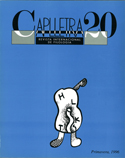Cognició, temporalitat i lingüística comparada: el pretèrit perfet perifràstic i la metàfora del temps en català
DOI:
https://doi.org/10.7203/caplletra.20.7354Keywords:
cognició, temporalitat, lingüística comparada, pretèrit perfet perifràstic, metàfora Abstract
Abstract
Metaphor is a means of conceptualizing the world around us and an anthropological universal of expression wich helps us apprehend time in terms of space. The purpose of this paper is thus to analyse a series of time metaphors in Catalan, and more particularly the vado + infinitive construction, by showing the relationship between the conceptualizing system of Catalan and that Of other languages, such as English, German, Italian, Portuguese, French, and, especially, Occitan and Spanish.
 Downloads
Downloads
Downloads
Published
How to Cite
-
Abstract471
-
PDF (Català)145
Issue
Section
License
Authors submitting work to Caplletra for publication must be the legitimate holder of the usage rights. Legitimacy for the purposes of publishing the work must also include images, tables, diagrams and any other materials that may complement the text, whether they are the author of such material or not.
Copyright: on publishing their work in the journal, the author grants Caplletra. Revista Internacional de Filologia usage rights (reproduction, distribution and public communication) for both the paper printed version and for the electronic version.
All work published in Caplletra is covered by the Creative Commons license type Attribution-NonCommercial-NoDerivatives 4.0 (CC BY-NC-ND 4.0).
RESPONSABILITY
Caplletra. Revista Internacional de Filologia does not necessarily identify with the points of view expressed in the papers it publishes.
Caplletra. Revista Internacional de Filologia accepts no responsibility whatsoever for any eventual infringement of intellectual property rights on the part of authors.






